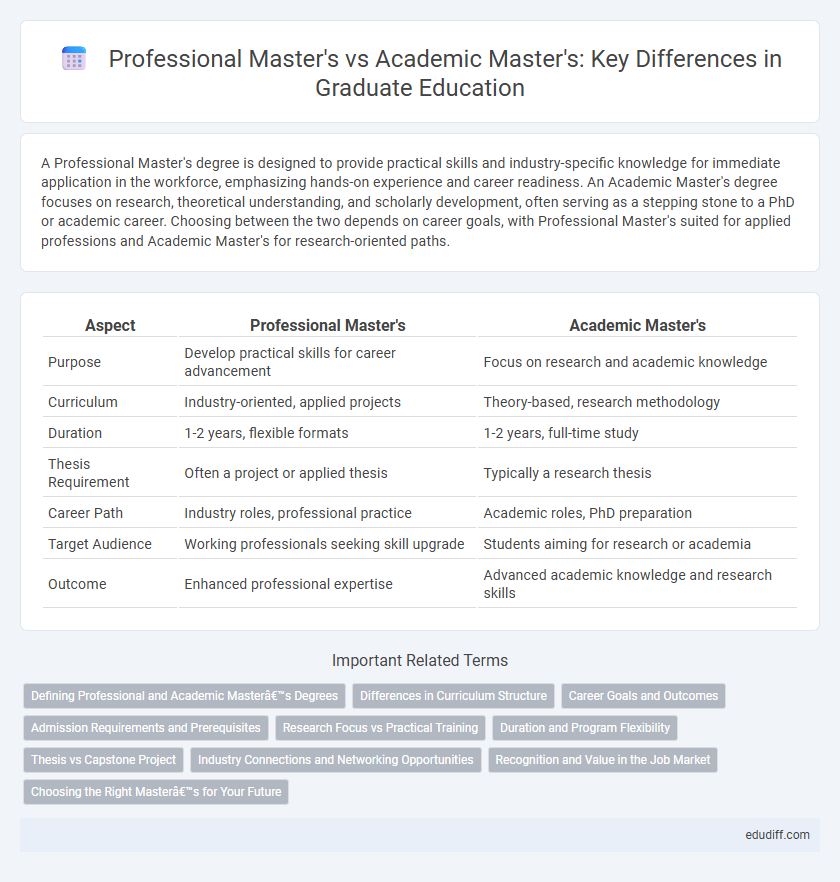A Professional Master's degree is designed to provide practical skills and industry-specific knowledge for immediate application in the workforce, emphasizing hands-on experience and career readiness. An Academic Master's degree focuses on research, theoretical understanding, and scholarly development, often serving as a stepping stone to a PhD or academic career. Choosing between the two depends on career goals, with Professional Master's suited for applied professions and Academic Master's for research-oriented paths.
Table of Comparison
| Aspect | Professional Master's | Academic Master's |
|---|---|---|
| Purpose | Develop practical skills for career advancement | Focus on research and academic knowledge |
| Curriculum | Industry-oriented, applied projects | Theory-based, research methodology |
| Duration | 1-2 years, flexible formats | 1-2 years, full-time study |
| Thesis Requirement | Often a project or applied thesis | Typically a research thesis |
| Career Path | Industry roles, professional practice | Academic roles, PhD preparation |
| Target Audience | Working professionals seeking skill upgrade | Students aiming for research or academia |
| Outcome | Enhanced professional expertise | Advanced academic knowledge and research skills |
Defining Professional and Academic Master’s Degrees
Professional master's degrees prioritize practical skills and industry readiness, often featuring internships, project-based learning, and direct application of knowledge in fields like business, engineering, or healthcare. Academic master's degrees emphasize research, theoretical understanding, and scholarly development, preparing students for doctoral studies or careers in academia. The key distinction lies in professional programs targeting immediate workforce entry, while academic programs focus on advancing specialized knowledge and research capabilities.
Differences in Curriculum Structure
Professional Master's programs emphasize practical skills and real-world applications, featuring project-based learning, internships, and industry collaborations tailored to specific careers. Academic Master's programs focus on theoretical knowledge, research methodologies, and disciplinary depth, often requiring a thesis or comprehensive exams for scholarly advancement. Curriculum structures differ as professional masters prioritize experiential learning while academic masters aim to develop analytical and research competencies.
Career Goals and Outcomes
Professional Master's degrees emphasize practical skills and industry-specific knowledge designed to enhance career readiness and immediate job performance, often leading to direct employment in specialized roles. Academic Master's programs prioritize theoretical research and advanced study, preparing graduates for doctoral education or careers in academia and research-intensive fields. Career outcomes for Professional Master's graduates typically include higher earning potential and quicker job placement, while Academic Master's holders often pursue long-term scholarly or research positions.
Admission Requirements and Prerequisites
Professional Master's programs typically require relevant work experience, a bachelor's degree in a related field, and letters of recommendation emphasizing practical skills, while Academic Master's programs focus on strong academic records, standardized test scores like the GRE, and research experience. Admissions criteria for Professional Master's degrees often prioritize professional certifications and interviews assessing applied knowledge, whereas Academic Master's admissions demand a clear research proposal and often a higher GPA in academic coursework. Prerequisites for Professional Master's degrees may include prior internships or industry exposure, contrasting with the Academic Master's emphasis on foundational coursework in the discipline and academic publications.
Research Focus vs Practical Training
A Professional Master's degree emphasizes practical training designed to develop industry-specific skills and prepare graduates for immediate workforce application, often including internships and applied projects. In contrast, an Academic Master's focuses on research-oriented study, fostering critical analysis and theoretical knowledge to prepare students for doctoral programs or academic careers. The Professional Master's targets experiential learning with real-world problem solving, whereas the Academic Master's prioritizes scholarly research methodology and contribution to academic knowledge.
Duration and Program Flexibility
Professional Master's programs typically last 1 to 2 years with flexible scheduling options designed for working professionals, incorporating practical experience and project-based learning. Academic Master's degrees usually span 1.5 to 2 years, emphasizing research and theoretical knowledge with more rigid course structures and full-time study requirements. Program flexibility and duration vary significantly based on career objectives and learning preferences.
Thesis vs Capstone Project
Professional Master's programs typically emphasize a Capstone Project that applies practical skills to real-world problems, preparing graduates for immediate industry challenges. Academic Master's programs often require a Thesis, focusing on original research and contributing to scholarly knowledge within a specific field. This distinction impacts career paths, with Capstone Projects favoring professional development and Theses aligning with academic or research-oriented pursuits.
Industry Connections and Networking Opportunities
Professional Master's programs emphasize strong industry connections and practical networking opportunities by partnering with businesses, facilitating internships, and hosting industry-specific events. Academic Master's programs primarily focus on theoretical research and scholarly development, offering limited direct engagement with industry professionals. Graduates of Professional Master's degrees often benefit from expanded career pathways through these robust industry linkages.
Recognition and Value in the Job Market
Professional Master's degrees emphasize practical skills and industry-relevant expertise, making them highly recognized and valued by employers in fields such as business, engineering, and healthcare. Academic Master's programs focus on research and theoretical knowledge, often preferred for careers in academia or roles requiring advanced analytical abilities. In the job market, professional master's graduates typically experience faster employability and higher starting salaries due to their direct alignment with industry demands.
Choosing the Right Master’s for Your Future
Professional Master's programs emphasize practical skills and industry-ready expertise, ideal for graduates aiming to enter or advance in specific careers quickly. Academic Master's degrees prioritize research, theory, and critical analysis, preparing students for doctoral studies or careers in academia and research institutions. Evaluating career goals and preferred learning styles is crucial when choosing between a Professional Master's and an Academic Master's to ensure alignment with future opportunities.
Professional Master’s vs Academic Master’s Infographic

 edudiff.com
edudiff.com